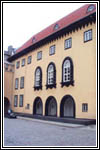 |
Vol 1, No 14
27 September 1999 |
|
|
 T H E A M B E R C O A S T:
T H E A M B E R C O A S T:
Historical Regicide Mel Huang When historian Magnus Ilmjarv released his decade-long research project on 1930s Estonian President Konstantin Pats, he probably did not expect such a massive outpouring of grief, anger, controversy and press coverage. Or perhaps he did. Nevertheless, the work has captured the imagination - or the suspicion - of nearly the entire nation. In his research, Ilmjarv comes out plainly stating that President Pats was on the take from the Soviets for several years, thus implying that the most beloved symbol of Estonia's interwar independence was guilty of treason. Immediately after the report's issue, the press made its allegations arguing it was the biggest story to grip the country since President Lennart Meri's call for Estonia to develop its own Nokia (Finnish mobile phone company). The research, assembled in the archives in Moscow, showed that President Pats "lobbied" for Moscow in the Estonian Riigikogu (parliament) and government both while he was in and out of the prime minister's seat. Also, it ascertained that Pats received thousands of US dollars over several years from the Soviets. However, to many Estonians, especially the elderly who remember the Pats days, the degrading of Pats is tantamount to an attack on Estonia itself. During a radio call-in show with Ilmjarv, callers berated the historian, even suggesting he be brought up on charges of high treason. Tartu's leading daily, Postimees, printed an interview with the beleaguered historian entitled "I Didn't Kill God!" The weekly tabloid Eesti Ekspress opened up another can of historical worms when it revealed that one of the funding sources of the research was Heldur Tonisson, the son of interwar-era Prime Minister Jaan Tonisson. During the 1920s and 1930s, Pats and Tonisson were more enemies than mere rivals; they often rejoiced when each other's cabinets fell. Pats represented well-off farmers in the agrarian bloc, while Tonisson headed the "Tartu spirit" group of nationalists and liberals. When the "Age of Silence" came after the in-house coup d'etat by Pats in 1934, Tonisson fell victim to retribution by Pats - which included being deprived of his newspaper, Postimees (yes, the same paper that printed the interview with Ilmjarv 65 years later). However, Tonisson had also sent envoys to meet with Artur Sirk, the head of the banned right-wing Estonian Veterans' League, in exile in Finland. The group later attempted a coup d'etat against Pats but failed. Ilmjarv immediately responded to the allegations of questionable funding by listing other funding sources, such as the Estonian Science Fund and other Estonian and foreign research institutions. However, the Tonisson connection appeals to the conspiracy-minded tabloids and the rumours persist. In a follow up, as wind of Ilmjarv's research reached Latvia and Lithuania and shocked those countries as well, historians from Estonia's two southern Baltic neighbours hinted at similar allegations against their own interwar leaders - Karlis Ulmanis (Latvia) and Antanas Smetona (Lithuania). Material presented by Ilmjarv and others showed that Ulmanis and Smetona also had "consultations" at the respective Soviet embassies and discussed various issues, such as the repression of Social Democrats. However, aside from the funding of the research, the other question is the validity of the sources. Some argue that the material in the Moscow archives is suspect. The less jaded say it is erroneous or imprecise, the more conspiracy-minded are convinced of forgeries and false trails planted to throw off researchers. In any case, with this latest historical controversy, many eyes remain turned toward the past - even as Estonia moves toward the end of the millennium. For many Estonians, defacing Pats is like denigrating Washington for Americans, De Gaulle for the French or Lajos Kossuth for the Hungarians. In some ways, the research has subverted the dreams of many who held on to the Pats years during the half-century of Soviet occupation. Mel Huang, 27 September 1999
|
|
![]()
Copyright (c) 1999 - Central Europe Review and Internet servis, a.s.
All Rights
Reserved